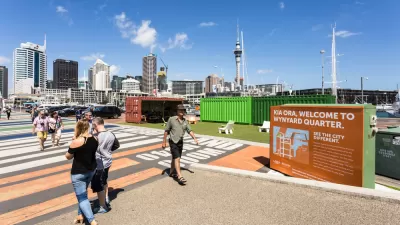What's your elevator pitch on why placemaking matters? Here's a couple rounded up by Hazel Borys, and some numbers that help refine their message.
"When a mayoral candidate from my city wrote me to ask me to repeat in writing what I’d said the night before, I realize I need to de-wonk and make my elevator speech more memorable. Why does city planning matter to people who aren’t urban designer types? If I could take an extra five minutes of your time, I’m interested in hearing each of your pitches, in the comments below. Here’s mine, thanks in part to countless conversations with many of you:
"For the last 75 years, we’ve been engaged in a Ponzi scheme of paying for the far-flung suburbs with money generated downtown, in compact neighborhoods, and from other levels of government. These sprawling bedroom communities, strip malls, and big boxes arranged in patterns where everyone needs a car are providing a negative return on investment. The roads, water, and sewer cost almost double for these dispersed places, while the return to city and private coffers pale in comparison. Compact neighborhoods return at least 10x more revenue per acre to the City, and often 1,000x more income per acre. At a time when less than half of our population doesn’t drive – because they’re too young, too old, too poor, or just choose not to – isn’t it about time that we change our zoning laws to make the sorts of places that will stop bankrupting our cities?"
Borys goes on to round up studies and numbers that make the case for walkable places.
FULL STORY: Why Placemaking Matters: What’s in it for me?

Alabama: Trump Terminates Settlements for Black Communities Harmed By Raw Sewage
Trump deemed the landmark civil rights agreement “illegal DEI and environmental justice policy.”

Study: Maui’s Plan to Convert Vacation Rentals to Long-Term Housing Could Cause Nearly $1 Billion Economic Loss
The plan would reduce visitor accommodation by 25% resulting in 1,900 jobs lost.

Planetizen Federal Action Tracker
A weekly monitor of how Trump’s orders and actions are impacting planners and planning in America.

Waymo Gets Permission to Map SF’s Market Street
If allowed to operate on the traffic-restricted street, Waymo’s autonomous taxis would have a leg up over ride-hailing competitors — and counter the city’s efforts to grow bike and pedestrian on the thoroughfare.

Parklet Symposium Highlights the Success of Shared Spaces
Parklets got a boost during the Covid-19 pandemic, when the concept was translated to outdoor dining programs that offered restaurants a lifeline during the shutdown.

Federal Homelessness Agency Places Entire Staff on Leave
The U.S. Interagency Council on Homelessness is the only federal agency dedicated to preventing and ending homelessness.
Urban Design for Planners 1: Software Tools
This six-course series explores essential urban design concepts using open source software and equips planners with the tools they need to participate fully in the urban design process.
Planning for Universal Design
Learn the tools for implementing Universal Design in planning regulations.
Caltrans
Smith Gee Studio
Institute for Housing and Urban Development Studies (IHS)
City of Grandview
Harvard GSD Executive Education
Toledo-Lucas County Plan Commissions
Salt Lake City
NYU Wagner Graduate School of Public Service



























